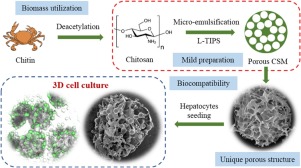Carbohydrate Polymers ( IF 10.7 ) Pub Date : 2018-09-17 , DOI: 10.1016/j.carbpol.2018.09.021 Lixia Huang , Lin Xiao , Abishek Jung Poudel , Jixiang Li , Ping Zhou , Mario Gauthier , Haiqing Liu , Zhihong Wu , Guang Yang

|
Highly porous chitosan microspheres (CSM) were prepared through emulsion-based thermally induced phase separation (TIPS) without using toxic crosslinkers and chemical porogenic agents other than ice. The CSM had an average diameter of ~150 μm with interconnected pores varying from 20~50 µm in size. Due to their excellent biocompatibility and unique porous structure, high-performance hepatocyte culture in three-dimensional (3D) space was achieved using the CSM as microcarriers, as cell growth also took place within the internal pores of the CSM, besides their external surface, and multidirectional cell–cell interactions were observed. Enhanced cellular activity and functions were obtained with the CSM microcarriers as compared with 2D cell culture. It is believed that these CSM microcarriers provide a promising platform for 3D cell culture in vitro.
中文翻译:

多孔壳聚糖微球作为3D细胞培养的微载体
高度多孔的壳聚糖微球(CSM)是通过基于乳液的热诱导相分离(TIPS)制备的,无需使用除冰以外的有毒交联剂和化学致孔剂。CSM的平均直径为〜150μm,相互连通的孔的大小在20〜50μm之间。由于其出色的生物相容性和独特的多孔结构,使用CSM作为微载体,可以在三维(3D)空间中实现高性能肝细胞培养,因为细胞生长也发生在CSM的内孔中,除了它们的外表面,并观察到多向细胞间相互作用。与2D细胞培养相比,使用CSM微载体可获得增强的细胞活性和功能。相信这些CSM微载体为3D细胞培养提供了有希望的平台体外。











































 京公网安备 11010802027423号
京公网安备 11010802027423号